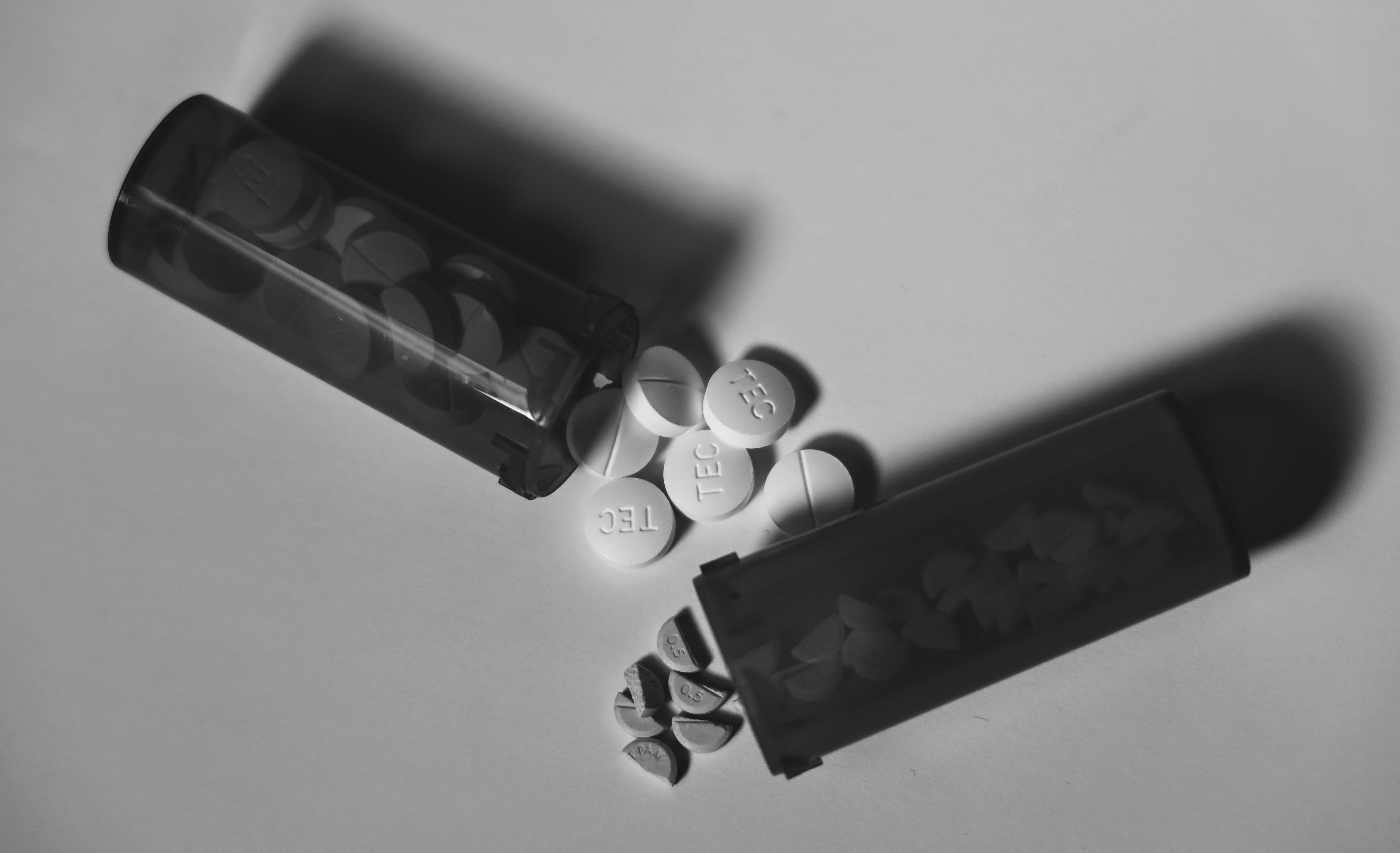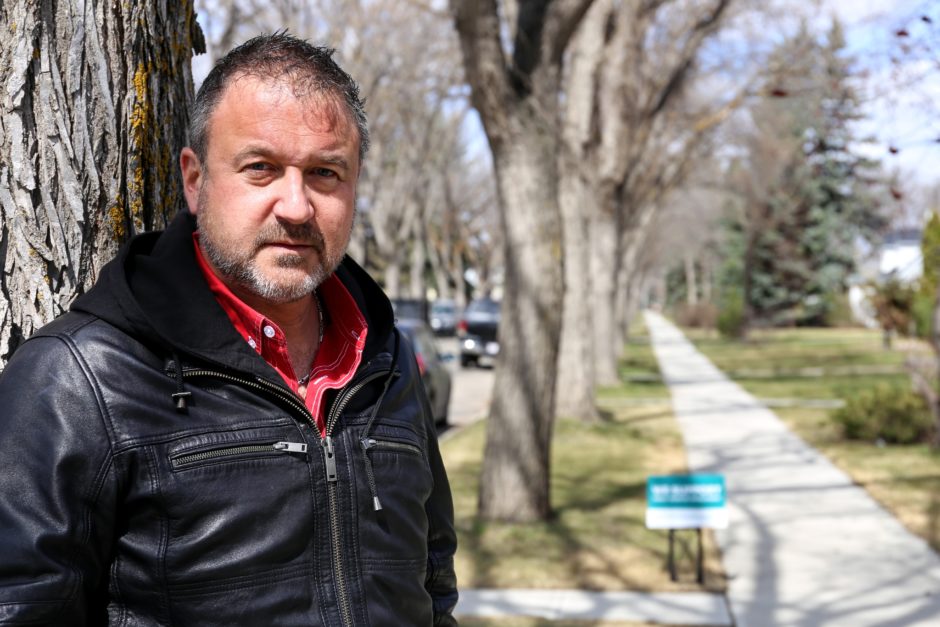Joel Gotlib sat alone on a queen-size bed in a four-star Miami Beach hotel room with a glorious view of the ocean and the beach.
It was a warm, sunny day, but the drapes were closed, and he had headphones on, his eyes fixed on an iPad as he watched the same music video over and over.
"Dad, I'm big, but we're smaller than small," the lyrics said. "In the scheme of things, well, we're nothing at all."
His girlfriend had asked him to go outside for a walk.
But he had refused to leave the room.
“I went on this trip that was supposed to be fun and happy and healing, and it was none of that,” Gotlib said of that January day more than a year ago. “And I realized just how addicted I was to the pills. And I was scared I was going to run out.
“I didn’t have anything booked for rehab. I didn’t know what to do next.”

‘I was in so much pain’
Gotlib’s opioid addiction began eight years ago, when he sought medical treatment for back and leg pain. He went to an Edmonton hospital emergency room, and while waiting was given two Percocets.
He was diagnosed with sciatica and the doctor sent him home with six more pills.
“It made me feel relaxed,” he said. “It eased up the pain. I felt lighter. I felt happier.”
He tried physiotherapy for a few months, but discontinued treatment and began walking with a cane. Then, in the spring of 2011, he made a doctor’s appointment.
“I was in so much pain,” said Gotlib, 51. “I was pleading to my doctor for anything to help get rid of the pain. So he prescribed me Percocet.”
He began with one pill a day. Soon he was up to three - taking 5 mg. every morning, noon and night. He tried to ration the pills so they’d last until he could call his doctor for a refill.
“I don’t think he intended for me to get hooked on it,” Gotlib said. “He trusted me to use them properly. He trusted me not to abuse them.”

He began to build up a tolerance to the drug, and increased the number of pills he took to get the same effect.
“Every time I took one, I felt good,” he said. “It didn’t just ease the pain. It made me feel good. And I wanted to keep feeling good.”
Gotlib sometimes suffered panic attacks while he was live on the CTV Edmonton anchor desk. In the newsroom, the pill bottle was never far away.
“I was eating them like candy,” he said. “I’d take them in front of people, too.”
He said no one ever questioned him at work about the pills.
“I think I could have done a better job had I been off the pills,” he admitted. “I still did my job, but I could have done it even better without them.”

‘It’s all about the pills’
In November 2017, Gotlib was removed from the anchor job he had loved for nearly 14 years. His marriage was over and his estranged wife let him know she was pregnant with another man’s baby.
Desperate, Gotlib asked his older brother, a psychiatrist, to fly to Edmonton from Toronto for a visit. He needed advice.
The two brothers sat down and talked in Gotlib’s basement family room.
“I’m miserable, I’m unhappy,” he told his brother, David. “I don’t know how to get out of this.”
The first question his brother asked was, how many Percocet he was taking each day.
Gotlib insisted the pills had nothing to do with his troubles. His brother disagreed.
“And he goes, ‘Actually, Joel, it’s all about the pills. That’s the root of all of your problems.’ ”

Gotlib downplayed the number he was taking, admitting to a dozen a day. In truth, it was more like 18. And he’d been on them for seven years.
His brother told him that was way too many, and he’d been on them for way too long.
“He says, ‘You don’t realize it, but these pills put you in a slow and steady decline. And that’s exactly what’s happened to you. And if you don’t get off these pills, things aren’t going to get better for you.’ ”
Gotlib slowly climbed the stairs from the basement and told his girlfriend he needed help.

Johanna Deleurme had just moved in with him two months earlier. She knew he was depressed. Until that moment, she had no idea he was also addicted to opioids.
“At that point, all I knew was that he was going to have to get help,” Deleurme said. “Because he couldn’t carry on the way he was. It was really bad.”
Gotlib was on medical leave. He spent December cocooned in his basement, popping pills, wallowing in despair and depression.
Deleurme was afraid to leave him alone when she went to work each morning.
“It was very stressful,” she said. “I didn’t know if he would harm himself. But I didn’t know how much he was taking. I just had no idea if I was going to come home and find him gone.”
She panicked whenever a phone call or text message went unanswered.

In hindsight, Gotlib admits he’s lucky he never overdosed when he combined prescription Percocet with the tranquilizer clonazepam for panic attacks.
“I was playing a game of Russian roulette, I think,” Gotlib said. “Sometimes I took pills that were a lethal mix.”
He tried to turn things around with that January trip to Miami Beach. After he and Deleurme returned home, he agreed to check into a British Columbia rehabilitation facility at the end of the month.
Listen to Gotlib and Deleurme talk about the days leading to his rehabilitation.
“One of the main reasons I decided to seek help was because of my three young children,” he said. “I didn’t want them to grow up without their dad.”
Before heading to Orchard Recovery Center, Gotlib made an appointment with the family doctor who had been prescribing his opioids for years. He told his doctor he was an addict and was going for treatment. The physician, he said, wrote him a prescription for 300 Percocet.
Gotlib hid half the pills in a ski boot in his basement.
“It was a security blanket for me,” he said. “Which defeats the whole purpose of going to rehab. But that was my mindset.”

Rehab ‘got very real. Very fast.’
Gotlib popped Percocet right up until the moment he walked through the gates of the rehabilitation facility on Bowen Island. He was cut off drugs completely and quickly began to experience withdrawal symptoms.
“It got very real, very fast,” he said. “I was such a wreck.”
He was also angry. On the first full day of treatment, Gotlib went to the director’s office and demanded to leave, arguing he didn’t belong with the methamphetamine, fentanyl and heroin addicts at the facility.
She tried to convince him he risked an overdose if he left and began using Percocet again.
Gotlib called his girlfriend.
“He was very angry,” Deleurme recalled. “He said to me, ‘You don’t know what it’s like to be here. I don’t want to be here.’ I said if you want to leave, then leave. But there are consequences to those decisions.”
He stayed.
With the help of medication to ease his withdrawal symptoms, the Percocet fog began to lift.

He called Deleurme on his third day of treatment and confessed he’d hidden pills in the ski boot. He asked her to get all the pills out of the house and take them to a pharmacy.
“It was miraculous really,” Deleurme said. “The Joel I got to know after he was in treatment was more relaxed. The depression was gone.”
Gotlib spent 28 days in rehab. It cost him $17,000.
“I was in such a bad place, I needed a rebirth,” he said. “And that was it.”
A year ago, Gotlib and CTV Edmonton “parted ways” and he said he's not sure yet what the future holds. He has stayed clean and sober for the past fourteen months, continues to attend Narcotics Anonymous meetings, and has returned to The Orchard a number of times to help other addicts trying to kick their habits.

“I believe I have a story to tell, and I’m lucky I’m still here to tell the story," he said. "There are people out there addicted to opiates and want to get off them, but don’t know how."
In Alberta, two people die every day from accidental opioid overdoses. The death toll has been steadily rising since 2014.
“They need to know there’s a way out,” Gotlib said.
A couple of months ago, he proposed to Deleurme and she accepted.
“I don’t know where I’m going to end up, but something good is going to happen,” he said. “I just don’t know what it is yet.”

Watch what happened after Gotlib shared his story. He sat down and spoke to CBC Edmonton's Nancy Carlson.
